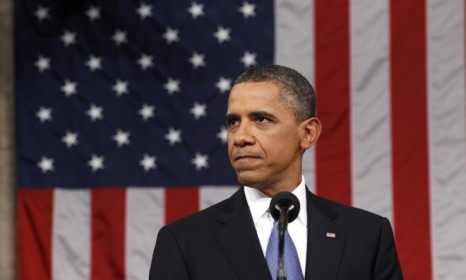Obama's 'feisty' jobs speech: 5 takeaways
In an aggressive speech to a joint session of Congress, the president unveils his $447 billion plan to rejuvenate the economy. Will it work?

A free daily email with the biggest news stories of the day – and the best features from TheWeek.com
You are now subscribed
Your newsletter sign-up was successful
After watching the president urge and cajole a joint session of Congress on Thursday to pass his American Jobs Act, "friends and foes alike had to wonder," says Howard Fineman at The Huffington Post: "Where has that Barack Obama been?" In about 37 minutes, a "startling, feisty, combative and, in a way, commanding" Obama laid out his $447 billion plan to jolt the economy — largely through a mix of tax cuts, infrastructure spending, state aid, and other measures. Obama pointed out that every part of his plan had at one point enjoyed bipartisan support, promised that every initiative would be paid for, and repeatedly challenged Congress to pass it right away. Here, five key takeaways from Obama's big speech:
1. Obama is through playing nice
"After months of being a negotiator, Obama finally looked like a president," says E.J. Dionne at The Washington Post. He didn't politely ask the Republican House to pass his bill as much as he dared them not to. "He might as well have said to the Republicans, 'So what's your problem?'" Indeed, Obama "sounded rather done with the preposterous business of bipartisanship, at least with these particular boys and girls," says P.M. Carpenter at his blog. He cajoled, threatened, "demanded all or nothing." In other words, "he led."
The Week
Escape your echo chamber. Get the facts behind the news, plus analysis from multiple perspectives.

Sign up for The Week's Free Newsletters
From our morning news briefing to a weekly Good News Newsletter, get the best of The Week delivered directly to your inbox.
From our morning news briefing to a weekly Good News Newsletter, get the best of The Week delivered directly to your inbox.
2. We can expect more of this on the campaign trail
The obvious takeaway from the "fiery, pugnacious speech" is that "Obama has begun campaigning in earnest for the 2012 election," says Will Wilkinson at The Economist. And if anyone was wondering what template Obama has picked for his re-election effort — perhaps FDR in 1936, or Reagan in 1984 — the speech provided the answer, says The Huffington Post's Fineman: Truman in 1948, when "Give 'Em Hell Harry" eked out a win by pounding on the "do-nothing" GOP-led Congress. The question is: Has "Give 'Em Hell Barry" showed up too late to make a difference?
3. It's all about the independents
The speech may have included some red meat for the base, but it was largely aimed at moderate swing voters, says Andrew Sullivan at The Daily Beast. Obama artfully presented himself "as the pragmatic centrist he actually is." His sensible, bipartisan blend of tax cuts and infrastructure spending will appeal to "the center in ways Republicans may feel a little leery of rejecting." Add in his "steely impatience," and you get "what you might call aggressive conciliation."
A free daily email with the biggest news stories of the day – and the best features from TheWeek.com
4. This wasn't just a speech — Obama has a bill
This wasn't Obama's first "do-or-die speech," says Jonathan Capehart at The Washington Post. But it's "the first time in his presidency that he's sent a bill to Congress," and it looks like he might fight for it. This is a big shift, and it signals there will be "no more whining from the House and Senate that the president hasn't told them what he wants." If Congress doesn't like the bill, it can't do nothing and blame Obama.
5. But Republicans probably won't pass it
Don't expect Republicans to heed Obama's "new tagline" — "You should pass this right away," says Kevin Drum at Mother Jones. "The incentive for Republicans to obstruct everything that comes from the White House remains the same": Helping the economy helps Obama, and "making sure that everyone in America hates 'Washington' is good for Republicans." Still, Republicans might "cherry pick and pass the parts they like, such as free-trade deals," and ignore the rest, says Greg Ip at The Economist. Payroll tax cuts could be acceptable to the GOP, says Philip Klein in The Washington Examiner. But the rest of the "rehashed" proposals don't stand a chance.